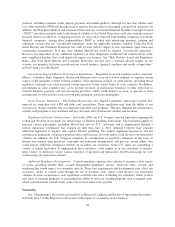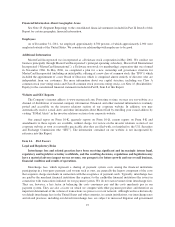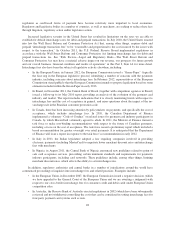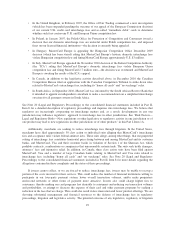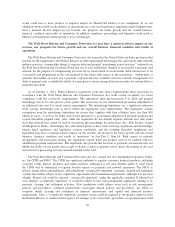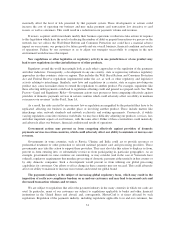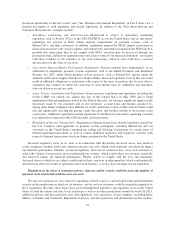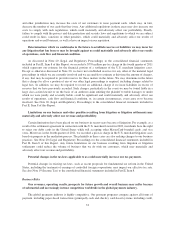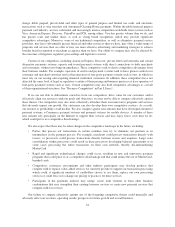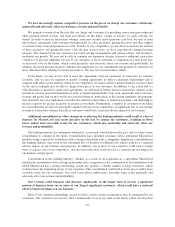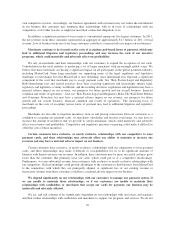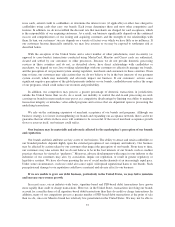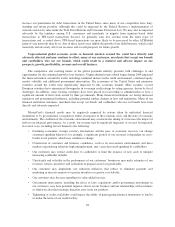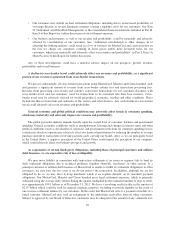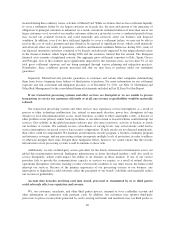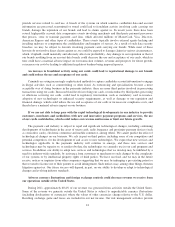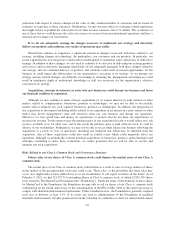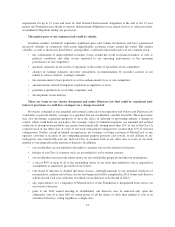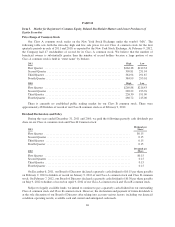MasterCard 2011 Annual Report Download - page 40
Download and view the complete annual report
Please find page 40 of the 2011 MasterCard annual report below. You can navigate through the pages in the report by either clicking on the pages listed below, or by using the keyword search tool below to find specific information within the annual report.own competitive services. Accordingly, our business agreements with customers may not reduce the risk inherent
in our business that customers may terminate their relationships with us in favor of relationships with our
competitors, or for other reasons, or might not meet their contractual obligations to us.
In addition, a significant portion of our revenue is concentrated among our five largest customers. In 2011,
the net revenues from these customers represented an aggregate of approximately $1.7 billion, or 26%, of total
revenue. Loss of business from any of our large customers could have a material adverse impact on our business.
Merchants continue to be focused on the costs of accepting card-based forms of payment, which may
lead to additional litigation and regulatory proceedings and may increase the costs of our incentive
programs, which could materially and adversely affect our profitability.
We rely on merchants and their relationships with our customers to expand the acceptance of our cards.
Consolidation in the retail industry is producing a set of larger merchants with increasingly global scope. We
believe that these merchants are having a significant impact on all participants in the global payments industry,
including MasterCard. Some large merchants are supporting many of the legal, regulatory and legislative
challenges to interchange fees that MasterCard is now defending, since interchange fees represent a significant
component of the costs that merchants pay to accept payment cards. See “Risk Factors-Legal and Regulatory
Risks-Interchange fees and related practices have been receiving significant and increasingly intense legal,
regulatory and legislative scrutiny worldwide, and the resulting decisions, regulations and legislation may have a
material adverse impact on our revenue, our prospects for future growth and our overall business, financial
condition and results of operations.” Also see “Risk Factors-Legal and Regulatory Risks-The Wall Street Reform
and Consumer Protection Act may have a material adverse impact on our revenue, our prospects for future
growth and our overall business, financial condition and results of operations.” The increasing focus of
merchants on the costs of accepting various forms of payment may lead to additional litigation and regulatory
proceedings.
Merchants are also able to negotiate incentives from us and pricing concessions from our customers as a
condition to accepting our payment cards. As merchants consolidate and become even larger, we may have to
increase the amount of incentives that we provide to certain merchants, which could materially and adversely
affect our revenues and profitability. Competitive and regulatory pressures on pricing could make it difficult to
offset the costs of these incentives.
Certain customers have exclusive, or nearly exclusive, relationships with our competitors to issue
payment cards, and these relationships may adversely affect our ability to maintain or increase our
revenues and may have a material adverse impact on our business.
Certain customers have exclusive, or nearly-exclusive, relationships with our competitors to issue payment
cards, and these relationships may make it difficult or cost-prohibitive for us to do significant amounts of
business with them to increase our revenues. In addition, these customers may be more successful and may grow
faster than the customers that primarily issue our cards, which could put us at a competitive disadvantage.
Furthermore, we earn substantial revenue from customers with exclusive or nearly-exclusive relationships with
our competitors. Such relationships could provide advantages to the customers to shift business from MasterCard
to the competitors with which they are principally aligned. A significant loss of our existing revenue or
transaction volumes from these customers could have a material adverse impact on our business.
We depend significantly on our relationships with our customers to manage our payment system. If
we are unable to maintain those relationships, or if our customers are unable to maintain their
relationships with cardholders or merchants that accept our cards for payment, our business may be
materially and adversely affected.
We are, and will continue to be, significantly dependent on our relationships with our issuers and acquirers
and their further relationships with cardholders and merchants to support our programs and services. We do not
36


